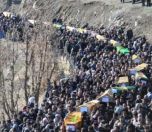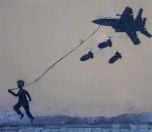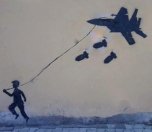Click to read the article in Turkish
Thirty-four civilians lost their lives in air raids carried out by the Turkish Air Force in Roboski district in the mostly Kurdish-populated southeastern province of Şırnak on December 28, 2011.
The pattern of impunity began when the Diyarbakır Chief Public Prosecutor's Office issued a verdict of "non-jurisdiction" on June 12, 2013.
The Constitutional Court on February 26, 2016, rejected an application by the Şırnak Bar Association, citing missing documents.
On May 17, 2018, the European Court of Human Rights (ECtHR) rejected an application by the families on the same grounds.
The result of a separate criminal complaint regarding the massacre is awaited.
"Roboski is not the only example"
Politician Ferhat Encü, who lost his relative in the massacre, spoke to bianet about the case and impunity.
"Unfortunately, Roboski is not the only example of impunity. Throughout the history of the republic, the policy of impunity has existed. It was implemented or tried to be implemented.
"Every case of impunity becomes a precedent for the next violation of rights. In fact, the policies of impunity emerge in times when the public reaction is not too strong. Yet the policy of impunity is not a periodic problem for Turkey. It is a mentality.
"When there is such a big massacre and who committed this massacre is known, the policy of impunity needs to be viewed as institutionalization or a way of governing."
The Uludere Public Prosecutor's Office had started to investigate the incident after the families' application, Encü noted. After issuing a verdict of "non-jurisdiction," the Diyarbakır Chief Public Prosecutor's Office sent the file to the Military Prosecutor's Office of the General Staff.
On January 7, 2013, the military prosecution stated in its justified decision that the "Turkish Armed Forces (TSK) personnel fulfilled the orders given to them within the scope of the decisions of the parliament and the Council of Ministers" and "made an inevitable mistake while performing their duties." Therefore, there was no reason to open a criminal case against them, it concluded, entering a nolle prosequi.
"A political decision"
Since the beginning, the authorities hadn't shown the necessary diligence as both the prosecutor's offices dismissed the case by citing a few missing documents, said Encü.
"If this reason was not there, a similar process would have been carried out for another reason. This is a purely political decision. It's a decision without any legal aspect and moral conscience, yet they justified themselves through it. This is not an acceptable situation."
Aside from the rejections of the ECtHR and the Constitutional Court, the Şırnak Bar Association's mistake by making an application with incomplete documents also disturbed the families, said Encü.
"I regard the missing files as a mistake by then Şırnak Bar Chair Nuşirevan Elçi and his board of executives. At the time, the Şırnak Bar was the most legally authorized unit in the name of us, the families. We provided the documents and letters of attorney requested by us.
"The process was under the responsibility of the board and the chairperson. Because the case was completed, we distanced ourselves from the bar association and dismissed them."
A process has been started to reopen the case, said Encü. "We applied to the Constitutional Court two years ago. We also made an application to the United Nations Human Rights Commission," he said.
The Roboski MassacreDecember 28, 2011 Around 7.17 p.m.: Having set off from Gülyazı and Ortasu villages in Turkey's Kurdish-majority southeastern province of Şırnak at noon to get diesel fuel, sugar, rice and tea from Zaho in Iraqi Kurdistan, 38 people, 17 of whom were younger than 18, started to return to Turkey in two groups. 7.28 - 20.21 p.m.: Five illumination and seven demolition shells were fired at a distance of 5-6 kilometers to the groups. 9.03 p.m.: Hearing that the road had been closed, the people walking in two groups decided to stop and wait somewhere near the border. 9.40 and 9.43 p.m.: Taking off from Diyarbakır, two F-16 jets of the Turkish Armed Forces bombarded the point where the first group was located. 10.02 p.m. The third bomb was dropped on the ones who parted their ways from the first group and were going to the north. 10.24 p.m.: The fourth bomb was dropped on the second group. On June 11, 2013, Public Prosecution of Diyarbakır issued a decision of non-jurisdiction on the case due to "reckless homicide" and sent the case to Military Prosecution of General Staff. Military Prosecution decided not to prosecute the case further on January 7, 2014. Lawyers of the victims' families objected to the decision, but they were rejected. Following this, the case was brought before the Constitutional Court. In a preliminary administrative examination of the application and its attachments, the court demanded some missing documents in the application be submitted yet the application was rejected on February 24, 2015 due to "outstanding documents not being submitted in time". The 281 applicants affected by Roboski Massacre applied to the European Court of Human Rights (ECtHR) on August 23, 2016, claiming human rights violations, particularly the right to life. the ECtHR dismissed the application on the same grounds as the Constitutional Court. Those who lost their lives in the massacre: Salih Encü, Seyithan Enç, Muhammed Encü, Cihan Encü, Selman Encü, Mehmed Ali Tosun, Erkan Encü, Nadir Alma, Osman Kaplan, Özcan Uysal, Zeydan Encü, Orhan Encü, Vedat Encü, Fadıl Encü, Şêrvan Encü, Şerafettin Encü, Şivan Encü, Savaş Encü, Karker Encü, Nevzat Encü, Mahsun Encü, Bilal Encü, Hüsnü Encü, Hamza Encü, Aslan Encü, Selam Encü, Adem Ant, Yüksel Ürek, Bedran Encü, Salih Ürek, Cemal Encü, Hüseyin Encü, Celal Encü, Serhat Encü... |
(HC/AÖ/AS/VK)






-132.jpg)

